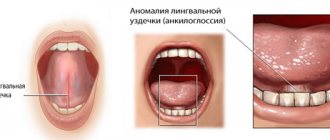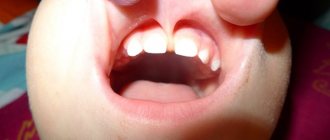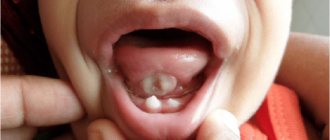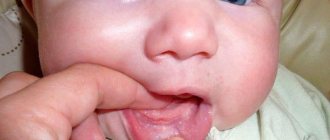Let's start with what a bridle is. When the upper lip is attached to the jaw bones, during the formation of the dentition, an “extra” fold of skin is formed - if you touch it with your tongue, it can be easily felt at the very base of the upper teeth from the outside.
In its normal state, the frenulum does not in any way affect the position of the teeth, the bite or the condition of the oral cavity. But a frenulum that is too short or, conversely, too large can directly affect the aesthetics and health of the dentition.
An untrimmed bridle can result in the following problems:
- Diastema
(a wide gap between the front teeth) when the upper incisors cannot meet closely due to a fold of skin.
- Additional load on the dental system.
- Speech therapy problems, diction disorders.
- Increased risk periodontal diseases
(a short frenulum “pulls back” the gum, causing the formation of a so-called gum pocket, in which plaque, bacterial deposits and tartar accumulate, which leads to gum inflammation).
As a rule, problems with the frenulum are detected in people already in childhood, and this is the most optimal period for plastic surgery of the frenulum of the upper lip. This is a simple and short operation, which in the future can eliminate the above problems.
Content:
Lip frenuloplasty is a corrective operation to trim the fold that attaches the lip to the jaw. Lip frenuloplasty was first performed in the middle of the last century. But now this procedure can be performed using a laser. It is laser lip frenuloplasty that will be discussed later in this article.
If there is an incorrect structure of the frenulum, a person begins to experience problems from this even in childhood, and over time they gradually intensify. The development of malocclusion, predisposition to periodontal disease, problems with articulation - this is not all that a person with an irregular lip frenulum may encounter.
Laser lip frenuloplasty can not only make your smile more beautiful, but also correct various problems with speech or with the installation of orthopedic structures, which are often observed in patients with improperly developed labial frenulum.
Laser excision of the labial frenulum is performed without complex special preparation, and the entire operation takes place quite quickly, and the patient does not experience any significant inconvenience. Laser surgery for lip frenuloplasty is a modern and excellent method of correcting it.
Causes of the defect
The most common cause of the defect, provoking half of the cases, is a genetic predisposition and hereditary factor.
Another reason is the use of hormonal medications and antibiotics by a pregnant woman. Moreover, the most dangerous period is the first trimester of gestation. This factor also influences the formation of other oral pathologies.
A certain motivating factor in the formation of pathology can be late pregnancy - after 35 years, but this is not at all necessary and has a negligible effect.
The exact causes of this problem have not been studied, so sometimes it appears even without obvious reasons.
Indications for surgery
You should know that not every pathology of the labial frenulum requires mandatory surgery. The advisability of excision of the frenulum is usually determined by the orthodontist or periodontist during an external examination of the patient.
The operation is indicated in the following cases: - For orthodontic treatment. Pathology of the frenulum can prevent the normal installation of dentures (plates and braces). - Presence of a diastema (gap between teeth). The gap between your front teeth can widen and lead to gum disease such as periodontitis. — Periodontal diseases. Due to the incorrect structure of the frenulum, food can accumulate under the lip, which gradually rots, thereby creating favorable conditions for the development of dental diseases. - Problems with speech. Severe pathology can sometimes cause impaired diction.
Short frenulum of the tongue in a child
Ankyloglossia in children can cause problems with feeding, development of speech function, and development of the dental system. The severity of functional disorders in a child with a short frenulum of the tongue depends on the length and elasticity of the ligament, the place of its attachment, the length and flexibility of the free edge of the tongue.
Difficulties with breastfeeding occur in a quarter of children with a short frenulum of the tongue. In this case, the baby cannot properly latch onto the breast with his mouth, which is why the nipple latch constantly worsens or repeatedly “loses” the breast during feeding. During sucking, characteristic sounds of clicking (clicking) of the tongue appear, restless behavior, and rapid fatigue are noted. At the same time, during one feeding, the baby sucks out a volume of milk that is insufficient for saturation. The consequence of insufficient nutrition is poor weight gain, and in some cases, malnutrition.
Often mothers note that a child with a short frenulum uses his lips to suck, bites or chews the breast with his gums, compensating for the incorrect position of the tongue and trying to increase pressure on the breast. If the child exerts a lot of tension, due to muscle fatigue, he may experience jaw tremors.
The process of feeding a child with a short frenulum of the tongue becomes tiring for mother and baby, and may be accompanied by pain due to injury and cracks in the nipple. Ineffective sucking leads to lactation problems (hypogalactia) because it does not stimulate milk production. In this regard, a child with a short frenulum of the tongue is often transferred to bottle feeding or artificial feeding.
In some cases, even with a short frenulum of the tongue, the baby sucks correctly and receives a sufficient amount of milk. In such children, an anatomical feature in the form of ankyloglossia may appear at an older age, during the period of formation of speech function. A short frenulum of the tongue in a child prevents the correct articulation of sonors ([p], ([p´], [l], [l´]), plucking ([w], [z], [h], [sch]) and others sounds of upper articulation ([t], [t'], [d], [d']). In speech therapy, this condition is regarded as mechanical dyslalia. With a polymorphic disorder of sound pronunciation, the child’s speech becomes illegible and incomprehensible to others.
A short frenulum of the tongue in a child can cause dental problems: open bite, prognathia, displacement of the dentition, the formation of a diastema between the lower front incisors, the development of gingivitis and periodontitis, exposure of the necks and the formation of dental hyperesthesia.
An older child and teenager with a short frenulum of the tongue may be bothered by a cosmetic defect (V-shaped tip of the tongue), constant tears of the frenulum, excessive salivation during speech, aerophagia, snoring and sleep apnea. This problem can leave a negative imprint on self-esteem and give rise to emotional and behavioral problems that require the intervention of a child psychologist.
Contraindications for surgery
There are practically no contraindications for laser excision of the labial frenulum compared to other operations. The procedure can be performed even on children as young as 6 years old.
Parents should know that laser lip frenuloplasty is the least traumatic and uncomplicated operation that can solve many problems that a child may encounter in adulthood.
Despite this, there are a small number of contraindications, including: - The patient has cancer; — Severe mental and neurological diseases; — Serious defects in the structure of the oral cavity; — Blood diseases; — Infectious diseases in the acute stage; — Advanced caries; - Osteomelit.
As you can see, contraindications are quite serious diseases that are rare. But it should be remembered that a referral for this operation, like any other, can only be given by a qualified dentist after an in-person consultation with the patient.
The main signs of a short frenulum
The following may indicate that your child has developed an abnormal frenulum:
- heart-shaped tongue, especially noticeable in an elevated position;
- difficulty stretching the tongue;
- bending of the tongue down when protruding it;
- difficulty swallowing;
- digestive problems, bloating and colic;
- Difficulty in pronouncing certain sounds.
Laser plastic surgery of the lip frenulum
There are several methods of performing lip frenuloplasty surgery. In modern dentistry, the following methods are used: frenotomy, frenectomy, frenuloplasty and laser plastic surgery of the labial frenulum. Among all these techniques, the most modern, safe and effective is, of course, performing the operation using special laser equipment.
Among the advantages are the following: - Almost complete absence of pain; - No bleeding; — The whole operation takes just a few minutes; — There are no significant restrictions before and after the operation; — The operation is performed on an outpatient basis, there is no need for hospitalization; — Sterility of the procedure; — Short recovery period.
No special preparation is required before the operation. Laser lip frenuloplasty begins with cleaning the oral cavity; professional teeth cleaning procedures can be performed. This is done to prevent infection, if any.
Next, a special gel is applied to the operated area, which acts as a local anesthetic, and the operation itself begins. The doctor, using special equipment, aims a laser at the lip frenulum, with the help of which the excision occurs. The impact of the laser not only dissolves the tissue, but also simultaneously achieves the effect of sterilization and cauterization of blood. Unlike other techniques, with laser frenuloplasty there is almost no blood or complications after surgery.
The postoperative period also does not require any special actions and does not introduce great restrictions into the normal rhythm of a person’s life.
It is recommended after surgery: - Carefully monitor oral hygiene; — Do not eat hot, spicy, sour or solid foods for several days;
About a week after the operation, you will need to visit the clinic for an examination, where the doctor will make sure that the operation was successful. The doctor will also recommend and help you learn special exercises for the mouth, aimed at strengthening the facial and chewing muscles.
What does a shortened frenulum look like?
Violation of the frenulum length can be understood in three ways:
- Firstly , the baby cannot stick its tongue out of its mouth, only slightly raising and lowering its edge. To test this reflex, you can run your finger over your baby's lips. In a normal reaction, the baby sticks his tongue out quite far, moving it around his lips in search of mother's milk.
- Secondly , the surest way to identify a small frenulum is to watch your child cry. When screaming, the tongue should rise strongly, and if there is a disease, only the very tip will lift up.
- Thirdly , a child with a frenulum defect cannot reach the palate with his tongue.
If these signs are not enough for parents to be convinced of the need for treatment, they can contact any pediatrician for a diagnosis.
The photo shows a short frenulum of the tongue
Lip frenuloplasty in Krasnodar
Laser lip frenuloplasty is a safe and effective method of frenulum correction, which is chosen by dentists in modern dental clinics. Our experts also recommend using laser techniques. This method allows you to achieve results in the shortest possible time.
In the city of Krasnodar, you can perform this procedure in our dental clinic “Symmetry”. The clinic has all the necessary modern, high-quality dental equipment. And our dentists have extensive experience and high qualifications, confirmed by many specialized diplomas and positive reviews from our patients.
Diagnostics
How to identify the problem yourself
The correct length of a baby's frenulum is considered to be 8 mm and above. To take the measurement, you should pull back the lower lip so that the baby opens his mouth. If the tongue is attached at the very edge and does not reach the lip, then most likely there is a shortening of the frenulum under the tongue.
For older people, a characteristic syndrome is identified when problems are detected with pronouncing individual letters (usually a lisp) and seeking help from a speech therapist.
How does a doctor diagnose?
Diagnosis of pathology is carried out by collecting anamnesis and visual examination of the patient
There are many child health specialists who can diagnose frenulum shortening:
- pediatrician;
- surgeon;
- neonatologist;
- dentist;
- orthodontist;
- ENT;
- speech therapist.
Diagnosis of pathology is carried out by collecting anamnesis and visual examination of the patient. The Haselbaker test, which takes into account the size of the frenulum and the mobility of the tongue, can help determine the disease.
In particular, according to the doctor’s method, it is considered normal if the bridge is longer than 0.8 cm, and the baby can easily reach his lips with his tongue and can lift it to the sky.
Is treatment for a defect always necessary?
In most infants, this pathology has only a minor effect on health, and sometimes is not diagnosed at all.
Typically, indications for surgery include serious developmental problems in the infant.
In most infants, this pathology has only a minor effect on health, and sometimes is not diagnosed at all.
If a defect is detected in a 5-year-old child, treatment is not prescribed. It will no longer be advisable, since it will not correct the bite and speech.
It is much more effective to correct the position of the teeth and develop the speech apparatus from the appropriate specialists.








